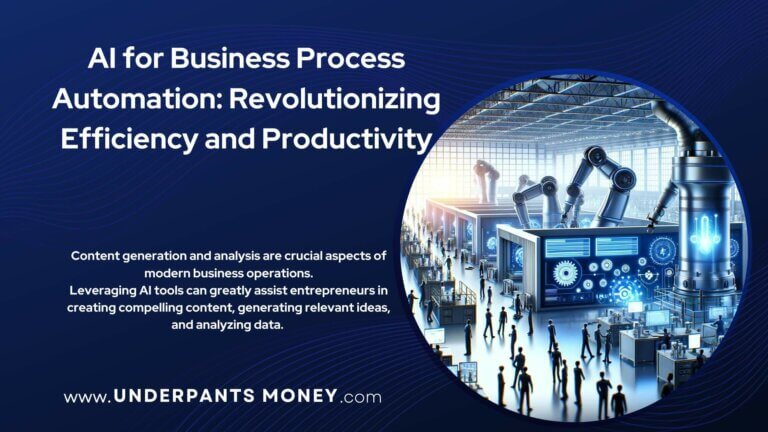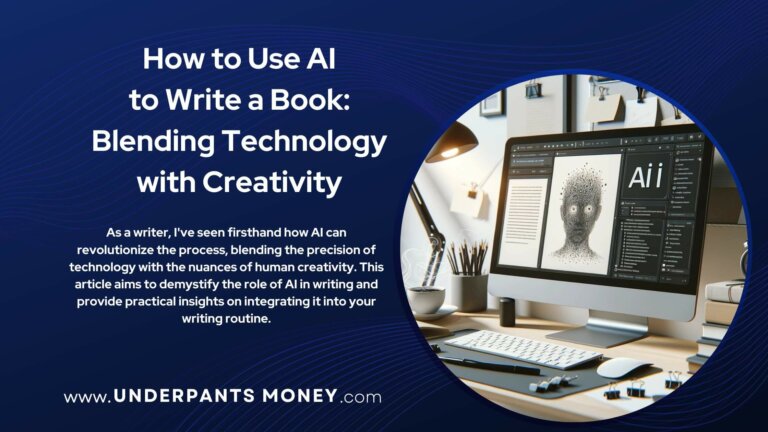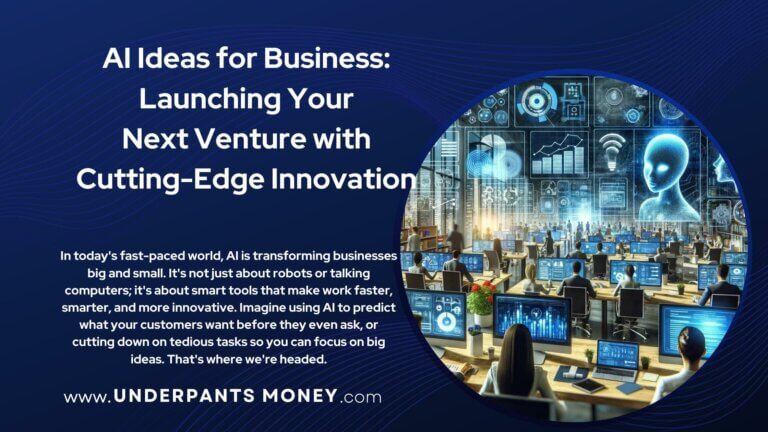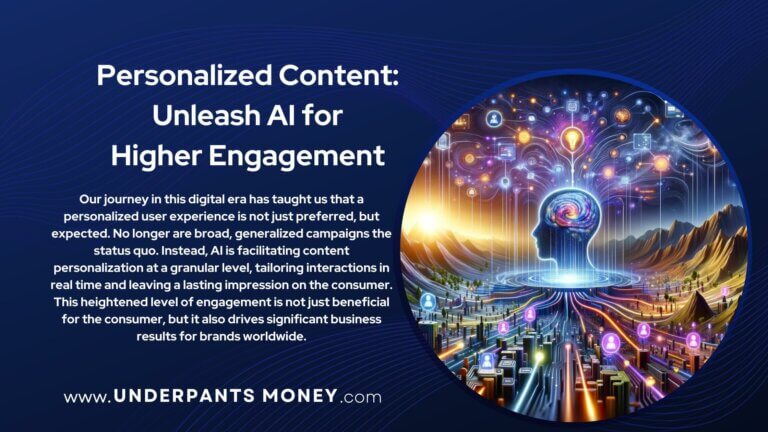Harnessing AI for Data-Driven Culture Success
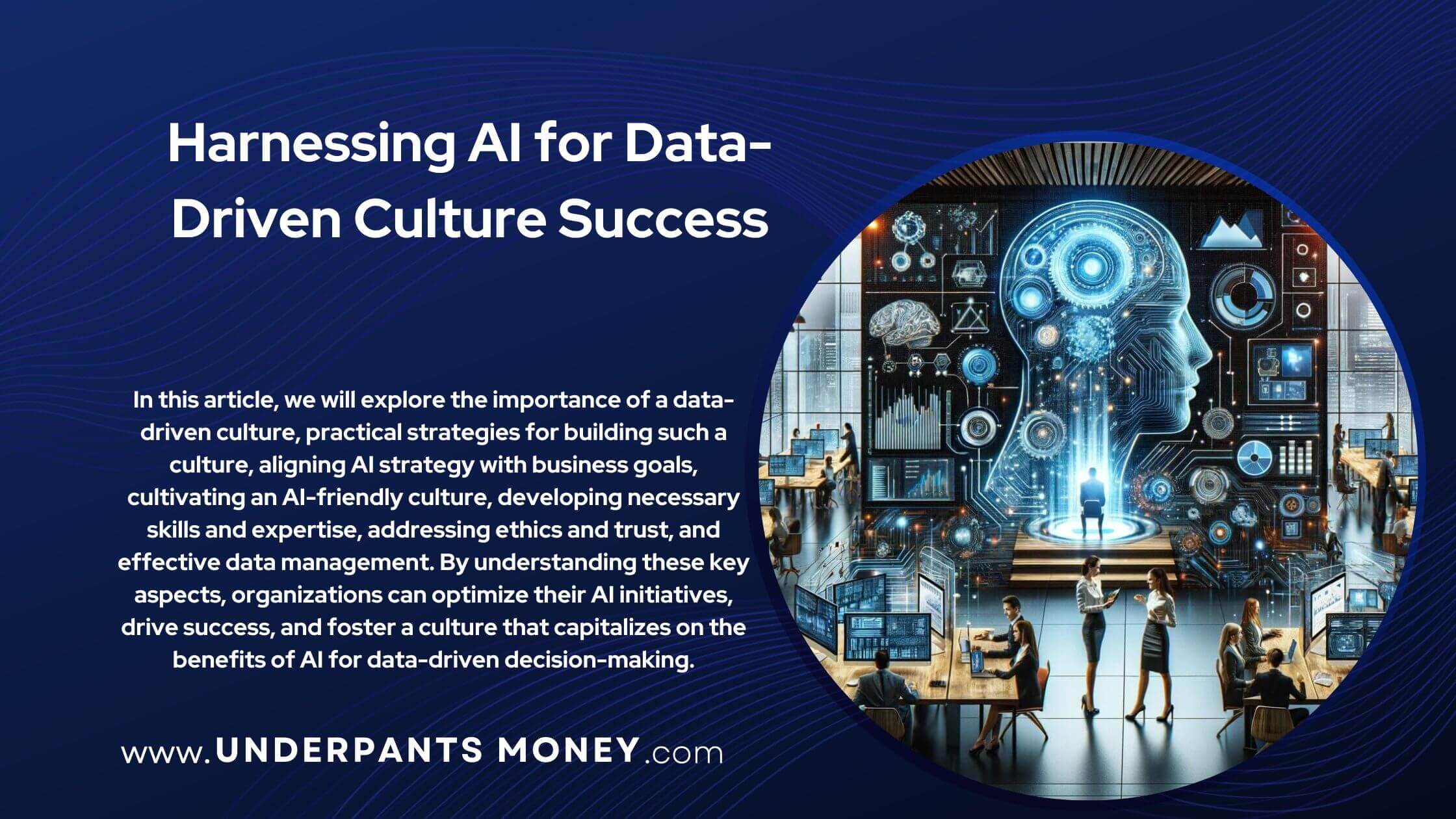
In today’s rapidly evolving business landscape, organizations are embracing the power of artificial intelligence (AI) to drive data-driven decision-making and achieve digital transformation. AI, including machine learning and predictive analytics, enables organizations to extract valuable insights from vast amounts of data, empowering them to make informed business decisions and gain a competitive edge.
With the increasing availability of AI solutions, organizations have the opportunity to harness the potential of data analysis and business intelligence to enhance their operations across various industries. By integrating AI into their data-driven culture, organizations can unlock new opportunities for growth and innovation.
In this article, we will explore the importance of a data-driven culture, practical strategies for building such a culture, aligning AI strategy with business goals, cultivating an AI-friendly culture, developing necessary skills and expertise, addressing ethics and trust, and effective data management. By understanding these key aspects, organizations can optimize their AI initiatives, drive success, and foster a culture that capitalizes on the benefits of AI for data-driven decision-making.

Key Takeaways:
- Artificial intelligence (AI) plays a vital role in driving data-driven decision-making and digital transformation.
- Integrating AI into a data-driven culture empowers organizations to extract valuable insights and gain a competitive edge.
- Building a data-driven culture requires leadership commitment, data literacy, and adoption of AI tools and technologies.
- A data-driven culture fosters collaboration, supports data-driven decision-making, and continuously adapts to evolving data strategies.
- Aligning AI strategy with business goals is essential for effective AI implementation and maximizing its benefits.
The Importance of a Data-Driven Culture
A data-driven culture is crucial for organizations to effectively implement AI and maximize the value of data. It goes beyond collecting and storing data and involves valuing data as a strategic asset. This culture requires leadership commitment, promoting data literacy, leveraging AI and data analysis, fostering collaboration and organizational change, and cultivating a data-driven mindset.
In today’s rapidly evolving business landscape, organizations are recognizing the importance of embracing a data-driven culture. By placing data at the center of decision-making processes, businesses can harness the power of AI to gain valuable insights and drive success.
The Value of Data Literacy
To truly integrate AI into a data-driven culture, organizations must prioritize data literacy among employees at all levels. Data literacy refers to the ability to understand, analyze, and communicate with data effectively. This includes interpreting data insights, asking the right questions, and making data-driven decisions.
By investing in data literacy initiatives, businesses empower their workforce to navigate the complexities of data analysis and AI technologies. This enables individuals to contribute insights, collaborate effectively, and drive data-centric decision-making processes.
“Data is a precious thing and will last longer than the systems themselves.”
– Tim Berners-Lee, inventor of the World Wide Web
Leveraging AI and Data Analysis
AI and data analysis are key components of a data-driven culture. These technologies enable organizations to extract valuable insights from vast amounts of data, identify patterns, and make data-driven predictions and recommendations.
By implementing AI-powered data analysis tools, businesses can automate repetitive tasks, optimize processes, and uncover hidden opportunities. AI can help organizations streamline operations, improve customer experiences, and enhance decision-making across various departments and functions.
Fostering Collaboration and Organizational Change
Building a data-driven culture requires collaboration and organizational change. This involves breaking down silos, promoting cross-functional teamwork, and fostering a collaborative environment where data insights are shared and acted upon.
Organizations must also embrace change and adapt their processes and systems to align with a data-driven approach. This may involve restructuring teams, implementing agile methodologies, and establishing clear channels for data communication and collaboration.
Cultivating a Data-Driven Mindset
A data-driven mindset is a critical component of a data-driven culture. It involves instilling a mindset that values data as a strategic asset, prioritizes data-driven decision-making, and encourages experimentation and continuous learning.
Leadership plays a crucial role in cultivating and reinforcing a data-driven mindset throughout the organization. By setting a clear vision, leading by example, and providing the necessary resources, leaders can inspire employees to embrace a data-driven approach and leverage AI technologies.
Benefits of a Data-Driven Culture
By cultivating a data-driven culture, organizations can harness the power of AI and create a competitive advantage in today’s data-driven business landscape.
Practical Strategies for Building a Data-Driven Culture
In order to foster a data-driven culture within organizations, it is essential to implement practical strategies that promote data literacy, collaboration, data-driven decision-making, and the adoption of AI tools and technologies. By overcoming resistance to change and continuously evolving our data strategies, we can ensure data quality and integrity while reaping the benefits of a data-driven culture.
Promoting Data Literacy and Education
To build a data-driven culture, we must prioritize data literacy and education. This involves providing training and resources to employees to develop the necessary skills to understand and interpret data effectively. By equipping our teams with the knowledge and capability to navigate data with confidence, we can empower them to make data-driven decisions that propel our organization forward.
Creating a Collaborative Environment
A collaborative environment is crucial for fostering data exploration and experimentation. By providing tools and platforms that facilitate collaboration and information sharing, we can promote a culture of innovation and problem-solving. This collaborative approach enables cross-functional teams to leverage diverse perspectives and collectively analyze data to uncover valuable insights.
Adopting AI Tools and Technologies
The integration of AI tools and technologies, such as skills.ai, is instrumental in enhancing data analysis and decision-making processes. By leveraging AI, we can automate data processing, uncover hidden patterns, and generate accurate predictions. Adopting AI tools and technologies enables us to streamline operations, maximize efficiency, and capitalize on the full potential of our data.
Fostering a Culture of Data-Driven Decision-Making
To establish a data-driven culture, it is imperative to nurture a mindset that values data-driven decision-making. Encouraging employees to rely on data insights when making decisions creates a foundation for optimal outcomes. By embracing data-driven decision-making, we can reduce reliance on assumptions and personal biases, enabling objective and informed choices.
Monitoring and Evaluating Data Quality and Integrity
Data quality and integrity are pivotal to the success of a data-driven culture. Implementing robust processes and systems to monitor and evaluate data quality ensures that we are working with accurate and reliable information. By prioritizing data quality and integrity, we can instill confidence in our data-driven decision-making processes and drive meaningful business outcomes.
Overcoming Resistance to Change
Resistance to change is a common barrier when transitioning to a data-driven culture. It is crucial to address this resistance by fostering open communication, providing clear explanations about the benefits of data-driven practices, and involving employees in the transformation process. By demonstrating the value and positive impact of data-driven approaches, we can overcome resistance and gain buy-in from stakeholders at all levels.
Continuous Adaptation and Evolution
Building a data-driven culture is an ongoing journey that requires continuous adaptation and evolution. As technology and data landscapes evolve, it is essential to stay ahead of the curve by embracing emerging tools and methodologies. By maintaining a growth mindset and proactively adapting to changes, we can ensure the longevity and effectiveness of our data-driven culture.
By implementing these practical strategies, organizations can build a data-driven culture that empowers employees, maximizes the value of data, and drives innovation and growth. Embracing data literacy, collaboration, AI tools, and a culture of data-driven decision-making lays the foundation for success in the digital age.

Aligning AI Strategy With Business Goals
Implementing AI requires a strategic approach that aligns with the business goals of an organization. To harness the full potential of AI and drive data-driven performance, it is crucial to identify specific challenges and solutions that can be addressed through AI implementation.
AI should be seen as a tool to solve business problems and achieve desired outcomes. Whether it’s improving profitability, enhancing customer satisfaction, fostering innovation, or promoting sustainability, aligning AI strategy with well-defined business goals is the key to success.
Companies like Amazon and Netflix have successfully aligned their AI strategy with business goals, propelling them to leadership positions in their respective industries. By prioritizing data-driven decision-making and leveraging AI technologies, these companies have achieved remarkable success.
An AI strategy that is aligned with business goals enables organizations to make informed decisions, enhance operational efficiency, and gain a competitive edge in the market.
The Challenges
Implementing AI to align with business goals does come with its own set of challenges. Some common challenges include:
- Lack of understanding: Organizations may struggle to fully comprehend how AI can contribute to their business goals.
- Data quality and integrity: Ensuring the reliability and accuracy of data used in AI systems can be a challenge.
- Resistance to change: Employees may resist the adoption of AI due to fear of job displacement or lack of understanding of its benefits.
- Integration with existing systems: Integrating AI systems with legacy systems and workflows can be complex and time-consuming.
The Solutions
To overcome these challenges and align AI strategy with business goals, organizations can:
- Invest in education and training: Providing employees with the necessary knowledge and skills to understand and embrace AI is essential.
- Ensure data quality and governance: Implementing robust data management practices and establishing data governance frameworks can enhance the reliability and integrity of AI-driven insights.
- Address employee concerns: Engaging employees in the AI adoption process, providing clear communication about the benefits of AI, and offering retraining opportunities can alleviate resistance to change.
- Partner with AI experts: Collaborating with AI experts and technology providers can streamline the integration process and ensure successful deployment of AI systems.
By addressing these challenges and implementing the right solutions, organizations can align their AI strategy with their business goals and unlock the true potential of AI for data-driven performance.

| Challenge | Solution |
|---|---|
| Lack of understanding | Invest in education and training |
| Data quality and integrity | Ensure data quality and governance |
| Resistance to change | Address employee concerns |
| Integration with existing systems | Partner with AI experts |
Cultivating an AI-Friendly Culture
To successfully harness the power of AI, businesses must cultivate an AI-friendly culture that embraces innovation and problem-solving. This culture encourages the adoption of AI technologies and addresses ethical and societal concerns that may arise. By fostering an environment that values education about AI and its potential, organizations can empower their employees to augment their human intelligence and create a culture of continuous learning and improvement.

Educating Employees About AI
One of the key components of an AI-friendly culture is education about AI. Organizations should provide comprehensive training programs and resources to ensure that employees understand the capabilities and limitations of AI. This education empowers employees to effectively leverage AI tools and technologies and encourages them to explore ways to integrate AI into their work processes.
Augmenting Human Intelligence
Another important aspect of an AI-friendly culture is recognizing the potential for AI to augment human intelligence. AI technologies can analyze large volumes of data, identify patterns and insights, and provide valuable recommendations. By embracing AI as a complement to human capabilities, organizations can empower their employees to make more informed decisions and solve complex problems more effectively.
Cultivating a Culture of Innovation and Problem-Solving
An AI-friendly culture is characterized by a culture of innovation and problem-solving. Organizations should create an environment that rewards experimentation, encourages collaboration, and celebrates new ideas. This fosters a mindset of continuous improvement and encourages employees to think creatively and explore innovative solutions to business challenges.
“The only way to discover the limits of the possible is to go beyond them into the impossible.”
– Arthur C. Clarke
Creating an AI-friendly culture is essential for businesses to fully embrace the AI revolution and thrive in the data-driven business landscape. By educating employees about AI, recognizing the potential for human augmentation, and fostering a culture of innovation and problem-solving, organizations can unlock the full potential of AI and gain a competitive advantage.
Skills and Expertise
Having the right skills and expertise is crucial for successfully implementing AI. As technology continues to evolve at a rapid pace, organizations must continually develop and enhance their skills to keep up with the demands of an AI-driven world. By investing in skills development, businesses can future-proof their workforce and ensure they have the capabilities to leverage AI effectively.
One approach to acquiring the necessary skills is through partnerships with experts in the field. Collaborating with AI specialists and data scientists can provide valuable insights and knowledge that can be applied to specific business needs. These partnerships enable organizations to tap into external expertise, accelerating their AI journey and avoiding common pitfalls.
Continuous learning is another key aspect of building expertise in AI. Organizations should create a learning ecosystem that supports ongoing education and growth. This can include training programs, workshops, certifications, and access to relevant resources. By fostering a culture of continuous learning, businesses can empower their employees to stay at the forefront of AI advancements and adapt to new challenges and opportunities.
Upskilling Existing Employees
Upskilling existing employees is an effective way to develop AI expertise within the organization. By investing in training programs and providing learning opportunities, businesses can help their employees acquire the necessary skills to work with AI technologies. This not only enhances the capabilities of the workforce but also contributes to employee engagement and retention.
Organizations can identify individuals who show potential and interest in AI and provide them with targeted training programs. These programs can cover areas such as data analysis, machine learning algorithms, AI ethics, and AI project management. By upskilling existing employees, businesses can harness their domain knowledge and experience while equipping them with the skills required to succeed in an AI-driven environment.
Building a Culture of Continuous Learning
In addition to upskilling employees, organizations need to foster a culture of continuous learning. This involves creating an environment where employees are encouraged to explore new technologies, experiment with AI tools, and share their knowledge and experiences. By promoting a culture of continuous learning, businesses can unlock the full potential of their workforce and drive innovation.
Investing in skills development, forming partnerships with experts, upskilling existing employees, and fostering a culture of continuous learning are essential for organizations seeking to future-proof their workforce and successfully implement AI. By prioritizing skills and expertise, businesses can position themselves as leaders in the AI-driven landscape and seize the opportunities that arise.

Ethics and Trust
In the age of artificial intelligence (AI), businesses face important ethical considerations and societal implications. As AI becomes increasingly integrated into our daily lives, organizations must prioritize ethics, trust, and responsible use of data. Failure to do so can lead to negative consequences for customers, the workforce, and society as a whole.
Implications for Customers and the Workforce
The widespread adoption of AI brings forth concerns about the impact on customers and the workforce. Organizations must carefully consider how AI systems may affect individuals and ensure that the technology serves the best interests of all stakeholders. This includes safeguarding privacy, protecting against bias and discrimination, and maintaining transparency in decision-making processes.
Privacy Concerns
As AI relies on vast amounts of data for training and decision-making, businesses must establish robust data governance practices to safeguard individuals’ privacy. Compliance with regulations, such as the General Data Protection Regulation (GDPR), is essential in maintaining data privacy and earning customers’ trust. Additionally, organizations should implement privacy-by-design principles, ensuring privacy considerations are deeply embedded in every stage of AI development and deployment.
AI Bias Mitigation
AI systems are only as unbiased as the data they are trained on, making bias mitigation a crucial aspect of AI development. Organizations should invest in diverse and inclusive datasets and implement strategies to detect and address biases in AI algorithms. Regular audits, reviews, and collaborations with external experts can help organizations identify and rectify potential biases, ensuring fairness and avoiding discriminatory outcomes.
Implementing Ethical Practices
Building trust requires organizations to go beyond compliance with regulations. It involves implementing ethical practices and internal policies that prioritize the responsible use of AI. This includes establishing multidisciplinary ethics committees, conducting ethical impact assessments, and fostering a culture of ethical awareness and accountability throughout the organization.
Regular Assessment of Impact
The ethical implications of AI are constantly evolving, as are the societal expectations surrounding its use. Organizations must proactively monitor and assess the impact of AI on various stakeholders to identify potential risks and make necessary adjustments. By regularly evaluating the ethical implications of AI, organizations can address emerging challenges, build trust, and ensure responsible AI use.
To build a sustainable and data-driven future, organizations must navigate the ethical considerations of AI and establish trust through responsible data governance and privacy practices. By prioritizing ethics and transparency, businesses can harness the power of AI while ensuring the well-being and trust of their customers and the wider society.

Conclusion
We have explored the transformative potential of AI in building a data-driven culture. By aligning AI strategy with business goals, organizations can harness the benefits of AI to enhance decision-making and gain a competitive edge in the data-driven landscape. Through AI, organizations can unlock valuable data insights, drive predictive analytics, and enable digital transformation.
Cultivating an AI-friendly culture is essential for success. Educating employees about AI and its capabilities, fostering a culture of innovation and problem-solving, and addressing ethical and societal implications are crucial steps. By embracing AI, organizations can augment human intelligence, encourage experimentation, and celebrate new ideas.
Developing the necessary skills and expertise is key to AI readiness. This may involve upskilling existing employees, partnering with experts, or creating a learning ecosystem to stay ahead of technological advancements. Effective data management, including data governance and privacy practices, ensures the integrity and trustworthiness of AI-driven insights.
Enriching the data-driven culture with AI is an ongoing journey. By aligning AI strategy with business goals, cultivating an AI-friendly culture, developing the necessary skills and expertise, ensuring ethical practices and trust, and effective data management, organizations can unleash the full potential of AI and thrive in the data-driven business landscape.
FAQ
What is a data-driven culture?
A data-driven culture is one in which organizations value data as a strategic asset and utilize it to drive decision-making, gain insights, and achieve competitive advantages.
Why is a data-driven culture important?
A data-driven culture is important because it enables organizations to effectively implement artificial intelligence (AI) technologies, maximize the value of data, and make data-driven decisions that can lead to improved performance and business outcomes.
How can organizations build a data-driven culture?
Organizations can build a data-driven culture by promoting data literacy and education, creating a collaborative environment for data exploration and experimentation, adopting AI tools and technologies, fostering a culture of data-driven decision-making, monitoring and evaluating data quality, overcoming resistance to change, and continuously adapting and evolving their data strategies.
How can organizations align their AI strategy with business goals?
Organizations can align their AI strategy with business goals by identifying specific problems or challenges they want to solve using AI, such as improving profits, customer satisfaction, innovation, or sustainability. AI should be seen as a solution to these business goals and used strategically to achieve them.
How can organizations cultivate an AI-friendly culture?
Organizations can cultivate an AI-friendly culture by educating employees about AI and demonstrating how it can augment human intelligence, foster innovation, and problem-solving. Creating a culture that rewards experimentation and celebrates new ideas is important for embracing the AI revolution.
What skills and expertise are crucial for successfully implementing AI?
Having the right skills and expertise is crucial for successfully implementing AI. This may involve hiring new talent, upskilling existing employees, or building partnerships with experts. Organizations need to create a learning ecosystem that supports continuous learning and stays ahead of technological advancements.
How can organizations address ethical and trust concerns related to AI?
Organizations can address ethical and trust concerns related to AI by implementing ethical practices, developing internal policies, regularly assessing the impact of AI, and ensuring responsible AI use. This includes considering implications for customers and the workforce, addressing privacy concerns, and mitigating AI bias.
What is the role of data management in building an AI-driven culture?
Data management plays a crucial role in building an AI-driven culture. It involves ensuring data quality and integrity, effective data governance, data privacy, and data security. By managing data effectively, organizations can derive accurate insights and make informed decisions using AI technologies.
How can organizations prepare for an AI-driven future?
Organizations can prepare for an AI-driven future by harnessing the power of AI for data-driven decision-making, continuously improving their data management practices, investing in skills development and partnerships, staying up-to-date with technological advancements, and fostering a culture that embraces innovation and change.

